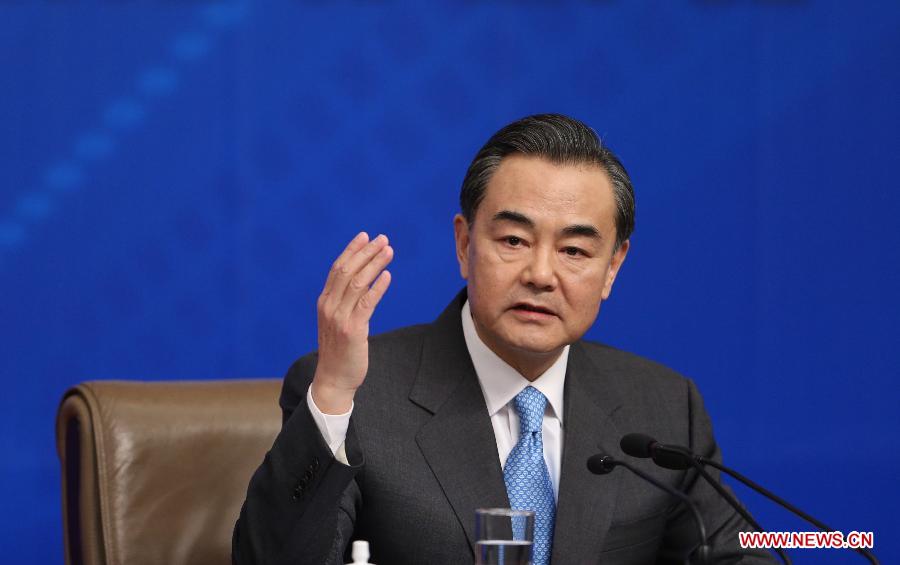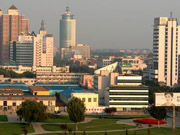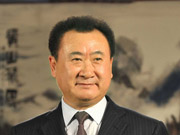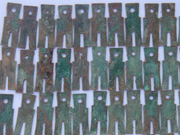 |
| Chinese Foreign Minister Wang Yi gives a press conference for the second session of China's 12th National People's Congress (NPC) on China's foreign policies, in Beijing, capital of China, March 8, 2014. (Xinhua/Jin Liwang) |
BEIJING, March 8 -- China's diplomacy will better serve its domestic reform and also its commitment to a more active international role, a top diplomat vowed on Saturday.
Foreign Minister Wang Yi took 16 questions on subjects ranging from China's relations with Japan and the United States, to the Ukraine crisis and Korean Peninsula situation, during a press conference on the sidelines of the country's ongoing top legislative session.
His answers highlight China's underlying principle of peaceful development and its resolution to safeguard territorial sovereignty.
According to the foreign minister, who is also China's ex-ambassador to Japan, this was the largest gathering of journalists he had faced since taking office last March.
"I am satisfied with his answers," said Andrey Kirillov of Russian news agency Itar-Tass, one of the hundreds of journalists packing the conference room. "He emphasized China's interests, but also repeatedly conveyed its idea of win-win situations through peaceful development."
"EVERY INCH" OF TERRITORY
Wang said China is determined to defend "every inch" of its territory and ruled out any possibility of compromise on historical and territorial issues with Japan.
"On the two issues of principle, history and territory, there is no room for compromise," he said.
The minister's remarks highlight the mounting tension between China and Japan. Relations between the two East Asian neighbors have reached a new low since Japan's "purchase" of the Diaoyu Islands in September 2012.
"2014 is not 1914, still less 1894," said Wang, responding to the parallel some have drawn between the current China-Japan relations and the Germany-Britain relations before the First World War.
"I want to emphasize that instead of using Germany before the First World War as an object lesson, why not use Germany after the Second World War as a role model?" he added.
In 1894, Japan waged the First Sino-Japanese War, in which China was defeated.
"Only by making a clean break with the past and stopping going back on one's own words can the relationship emerge from the current impasse and have a future," according to Wang.
In response to a separate question regarding China's neighborhood diplomacy policy, the minister said his country will never bully smaller nations, yet will neither accept unreasonable denouncements from them, adding that the general situation in China's neighborhood remains "stable and positive."
He said that China would like to carry out equal-footed consultation and negotiation, and properly handle its territorial and maritime disputes by peaceful means on the basis of historical facts and international law.
"When others respect us, we respect them even more," Wang said.
CHINA SOLUTION
During the press conference, where the foreign minister used the word "peace" at least 20 times, Wang said China will seek justice and uphold equality in international relations and protect the rights of developing countries in particular.
"We will take an active part in international and regional affairs and play a bigger role in solving global and regional issues by offering China's own solutions," he said.
He also vowed that China will better protect and serve overseas Chinese, and provide stronger protection for their growing legitimate rights and interests abroad.
"To better our diplomacy work, we need to have confidence," according to Wang. "It originates from the strength and prosperity of our motherland."
The senior diplomat told reporters that his country will not allow war or instability on the Korean Peninsula, China's "doorstep."
Regarding the Ukraine crisis, Wang called for calm and restraint to prevent further escalation.
"China is in communication with various parties and we will play a constructive role in bringing about a political settlement of the Ukraine issue," he vowed.
In 2014, China will host a series of international functions, including the Foreign Ministerial Conference of the Istanbul Process on Afghanistan, the CICA summit and the APEC Economic Leaders' Meeting.
Wang said the later two are key priorities for the country's diplomacy this year.
The country will work with Afghanistan and other neighbors to "resolutely fight all terrorist forces," the minister said.
According to Wang, another focus of China's diplomatic policy will be better serving the country's domestic reform through creating a favorable international environment.
China will strengthen friendly relations with all countries in the world, especially neighboring countries, so as to create a more enabling environment for the country's reform and development, he added.
TESTING GROUND
Wang listed three major developments in China's diplomatic strategy:
-- a new model of major-country relations to break the historical pattern of conflict and confrontation between major countries;
-- neighborhood diplomacy featuring amity, sincerity, mutual benefit and inclusiveness;
-- a more balanced approach between upholding justice and seeking interests.
Last year, Chinese President Xi Jinping and Premier Li Keqiang visited 22 countries, received 65 foreign heads of state and government in China and met more than 300 foreign dignitaries, while the country reached about 800 agreements with other countries.
Xi is due to visit Europe and Latin America, and Li Africa this year.
Commenting on Sino-U.S. relations, Wang said that if the new model of major-country relationship between the world's two largest economies is a building, mutual respect is the foundation.
"When the two sides truly respect each other's sovereignty, territorial integrity, social system, development path, core interests and major concerns, the foundation will be a solid one that can withstand storms, and truly grow into an edifice of win-win cooperation," he said.
The Asia-Pacific region should be the "testing ground" of the two countries' commitment to build a new model of relations, rather than "a competitive arena," according to the minister.
Regarding China's relations with Russia, Wang said his country will make sure that the China-Russia partnership continues to grow from strength to strength.
"The China-Russia relationship is in its best period in history, characterized by a high level of mutual trust, firm support for each other and intensifying cooperation in various fields," he said.

 800-year-old ancient village in Shanxi
800-year-old ancient village in Shanxi A glimpse of China's Zhongshan station in Antarctica
A glimpse of China's Zhongshan station in Antarctica Female marines receive tactical training in NW China
Female marines receive tactical training in NW China Shanghai women fall in love with Aerial Yoga
Shanghai women fall in love with Aerial Yoga This is Beijing – Nanluoguxiang
This is Beijing – Nanluoguxiang Old photos of Anti-Japanese War (1937-1945)
Old photos of Anti-Japanese War (1937-1945) Top 10 cities for falling house prices in January
Top 10 cities for falling house prices in January Top 10 richest real estate tycoons: Hurun
Top 10 richest real estate tycoons: Hurun Large numbers of ancient coins excavated in Inner Mongolia
Large numbers of ancient coins excavated in Inner Mongolia British WWII veteran: I can't forgive Japan
British WWII veteran: I can't forgive Japan Top 10 brands that win rich women's hearts
Top 10 brands that win rich women's hearts Memorizing the Flying Tigers
Memorizing the Flying Tigers The Chinese Dream: the Chinese Spirit and the Chinese Way
The Chinese Dream: the Chinese Spirit and the Chinese Way
Day|Week|Month